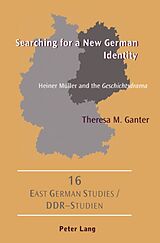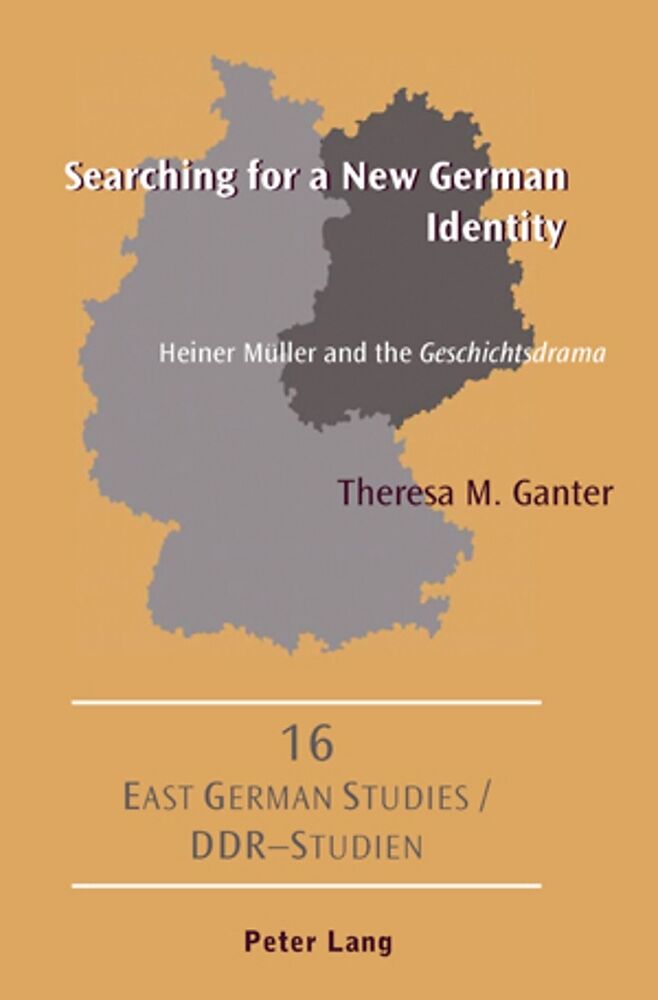Searching for a New German Identity
Einband:
Kartonierter Einband
EAN:
9783039110483
Untertitel:
Heiner Mller and the "Geschichtsdrama
Genre:
Sprach- und Literaturwissenschaften
Autor:
Theresa M. Ganter
Herausgeber:
Peter Lang
Anzahl Seiten:
456
Erscheinungsdatum:
03.06.2008
ISBN:
3039110489
This book investigates Heiner Müller's use of the Geschichtsdrama as a tool in his search for post-World War II and post-reunification German identity in Germania Tod in Berlin (1956/1971) and Germania 3 Gespenster am Toten Mann (1996), respectively. By using specific examples organized into relevant categories, the author demonstrates not only how these historical, allegorical, and political persons and events have affected the course of German history in Müller's opinion, but also how he believes they have influenced German identity of the past and present and may affect its future. In her analyses of these two dramas, the author explores the many historical, political, and allegorical characters as well as the abundant intertextual references by locating their original sources in order to explain their significance as each relates to Müller's perception of German identity at various points in time. The research focuses on Müller's use of the literary techniques of intertextuality, collage, metaphors, allegorical figures, political songs, ballads, and fairy tales. The methodological approach is eclectic: a mixture of New Criticism, New Historicism, and Rezeptionsästhetik.
Autorentext
The Author: Theresa M. Ganter has a B.A. in German, French, and International Studies and an International MBA from Baldwin-Wallace College in Berea, Ohio, an M.A. in German from The Ohio State University and a Ph.D. in German from The Pennsylvania State University. She worked for the German Federal Ministry of Education and Research (BMBF) in Bonn for two decades and has recently returned to the USA where she is pursuing her teaching and research interests.
Klappentext
This book investigates Heiner Müller s use of the Geschichtsdrama as a tool in his search for post-World War II and post-reunification German identity in Germania Tod in Berlin (1956/1971) and Germania 3 Gespenster am Toten Mann (1996), respectively. By using specific examples organized into relevant categories, the author demonstrates not only how these historical, allegorical, and political persons and events have affected the course of German history in Müller s opinion, but also how he believes they have influenced German identity of the past and present and may affect its future. In her analyses of these two dramas, the author explores the many historical, political, and allegorical characters as well as the abundant intertextual references by locating their original sources in order to explain their significance as each relates to Müller s perception of German identity at various points in time. The research focuses on Müller s use of the literary techniques of intertextuality, collage, metaphors, allegorical figures, political songs, ballads, and fairy tales. The methodological approach is eclectic: a mixture of New Criticism, New Historicism, and Rezeptionsästhetik.
Inhalt
Contents: Heiner Müller and German Identity - German History and Politics - Rosa Luxemburg and German Communism - Hitler and World War II - Stalin and Stalingrad - The Berlin Wall: FRG vs. GDR - German Reunification - Geschichtsdramen: Germania Tod in Berlin - Germania 3 Gespenster am Toten Mann.

Leider konnten wir für diesen Artikel keine Preise ermitteln ...
billigbuch.ch sucht jetzt für Sie die besten Angebote ...
Die aktuellen Verkaufspreise von 6 Onlineshops werden in Realtime abgefragt.
Sie können das gewünschte Produkt anschliessend direkt beim Anbieter Ihrer Wahl bestellen.
Loading...
Die aktuellen Verkaufspreise von 6 Onlineshops werden in Realtime abgefragt.
Sie können das gewünschte Produkt anschliessend direkt beim Anbieter Ihrer Wahl bestellen.
| # | Onlineshop | Preis CHF | Versand CHF | Total CHF | ||
|---|---|---|---|---|---|---|
| 1 | Seller | 0.00 | 0.00 | 0.00 |
